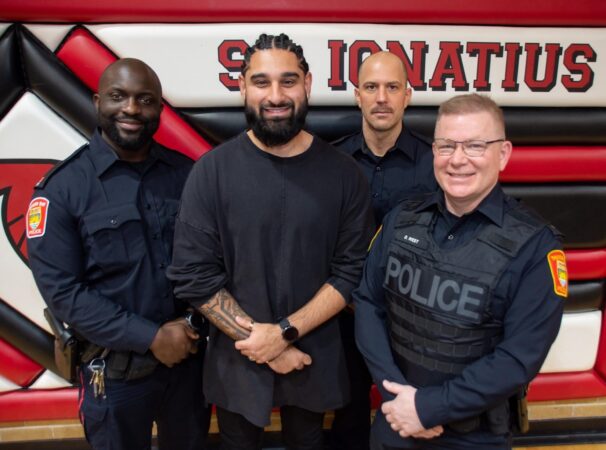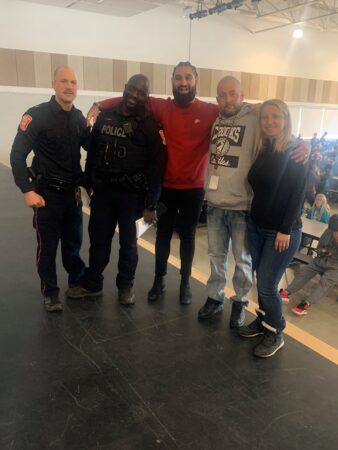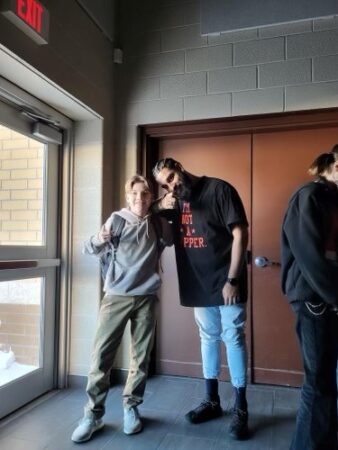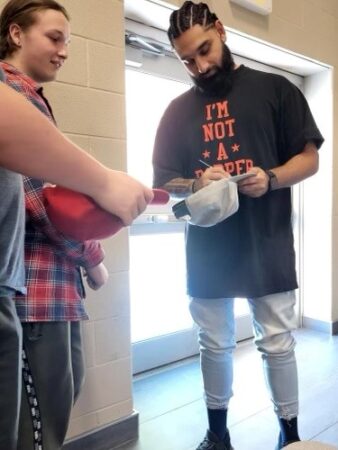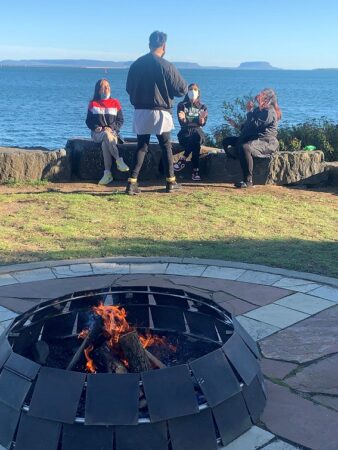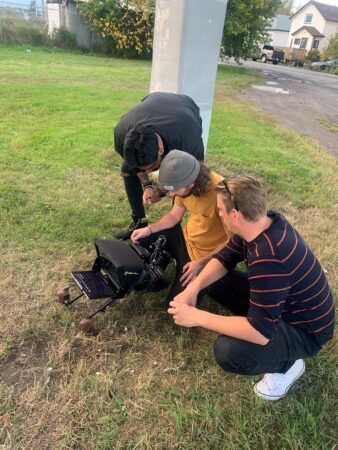
Features
A good life lived after gangs and drugs: Thunder Bay Police introduce innovative Dear Self project to community’s youth
July 31, 2023 By Brittani Schroeder
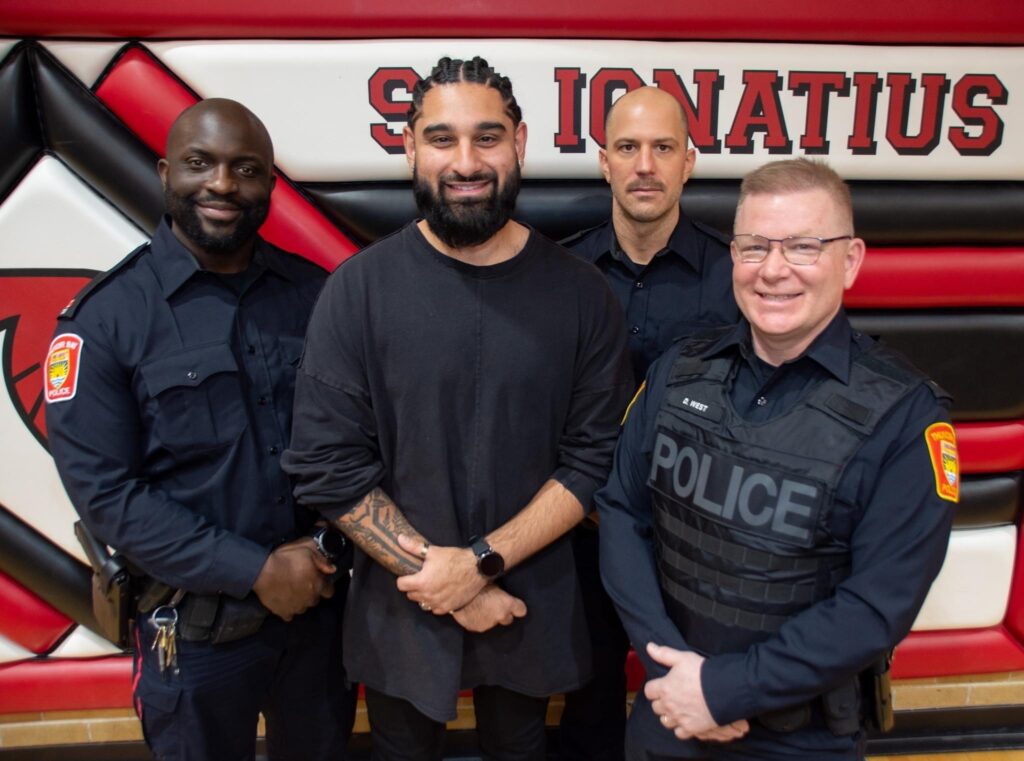 Photo credit: Thunder Bay Police Service
Photo credit: Thunder Bay Police Service In Thunder Bay, residents live a uniquely Northwestern Ontario life. They are eight hours away from Sault Ste. Marie and eight hours from Winnipeg. There are a few surrounding small towns and multiple Indigenous communities with many that can only be accessed by air or a lengthy drive. Thunder Bay acts as a service hub for health, education, and everything in between for all of these communities.
“There are several Indigenous-led schools in Thunder Bay to support high school aged youth who are from remote Northern communities. I recall Norma Kejick, the Executive Director of Northern Nishnawbe Education Council, being quoted to say ‘Indigenous youth needed the same quality education and access as non-Indigenous students’, so they established Dennis Franklin Cromarty High School in Thunder Bay. This allowed students access to a high quality education and with similar experiences to students in larger towns and cities,” says Insp. Derek West, Thunder Bay Police Service – Community Outreach.
For some youth who go to school in Thunder Bay and haven’t lived in a “big city” before, it can seem intimidating, lonely and unwelcoming. There are a lot of new things to be exposed to and this can lead to risky situations or behaviours, including risk of victimization or criminalization. “Initially, there wasn’t a ton of support for the youth staying in boarding homes and frequently we saw these young people experiencing mental health issues, using alcohol and drugs, or being at risk for recruitment to gangs,” said Insp. West.
“The most Important thing is to build relationships with the community, so they see us as more than just police.” – Insp. Derek West
Advertisement
In 2016, after the Seven Youth Inquest into the deaths of several Indigenous youth between 2000 and 2011, six recommendations came forth for the Thunder Bay Police Service (TBPS) to act on. One of these was that the TBPS needed to engage the Indigenous youth while they were still in their home communities—before coming to the city for school—and to talk to them about safety planning and what risks to be aware of. “The thought was that if we could build the relationships early, the youth would feel more comfortable reaching out to us in a time of need while they were away from home. We wanted to show that we were people they could trust,” explained Insp. West.
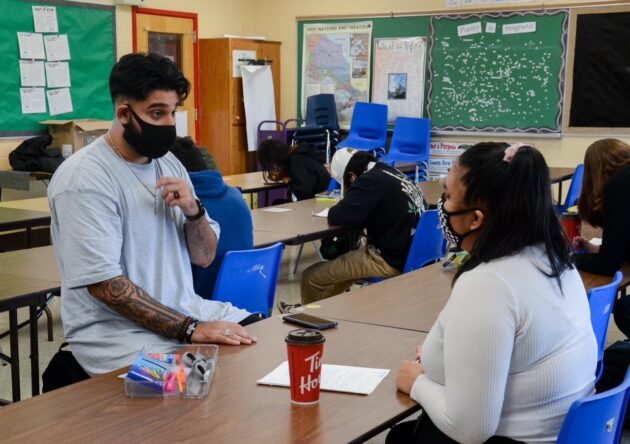
Photo credit: Thunder Bay Police Service
The TBPS went to the communities with presentations on safety, gangs and drugs, and after doing this for several years, they felt they should revamp how they ran this presentation. “Walking into a classroom with a PowerPoint presentation is not the way to reach or engage the kids,” said Insp. West. The Community Outreach team wanted to find a new way to engage the youth, then COVID-19 happened and that’s when Insp. West and Sgt. Julie Tilbury decided to pivot funds from the Project Prevent grant to focus on gang prevention tools. The funds for the Project Prevent grant came from the Ministry of Solicitor General – Proceeds of Crime (POC) Front-line Policing Grant Program – Guns and Gangs Violence priority. The TBPS was given the funding in 2019 to be used over three years.
Part of Project Prevent specifically looked at creating gang prevention activities, which focused on the reality of what happens when you fall through the cracks due to mental health and addiction issues. “We wanted to inform the youth of what could happen. We wanted to show that it wasn’t as sexy as TV and film made it out to be, and we wanted them to know that once you’re in, it’s really hard to get out,” said Sgt. Tilbury.
Before the TBPS could begin building the project and resources, the Community Outreach team connected with partners in various sectors to ask what they thought would be the best approach for engaging with the youth. They learned quickly that speaking from personal experience has the best impact on adolescents. “As an officer, we can lecture on why you shouldn’t join a gang or do drugs, but we’re not speaking from our own experiences. We’ve never lived that life. So, we needed to connect with someone who had,” said Sgt. Tilbury. “We also needed to think outside the box on how to deliver this information, because at times when our school resource officers go into the classrooms, the students keep their hoods on, their heads down and look at their phones. There’s no participation.”
This is when Sgt. Tilbury reached out to a dynamic speaker, Wali Shah, to speak to the students and share his story. As a spoken word poet, Shah had built a reputation for getting youth engaged. Sgt. Tilbury introduced Shah to some local people with lived experience to hear their stories. He knew this was important to create something special. The TBPS found two people who were willing to open up and share their stories. “It took a while, because a lot of people have their walls up around police officers, but eventually they felt comfortable enough to share and we helped them see that their stories could help change and impact other people,” said Sgt. Tilbury.
Shah created a spoken word piece called Dear Self that was captured on video. The TBPS also filmed two community members, Kyle Arnold and Jessica Wilson, as they told their stories. Originally, Kyle and Jessica wanted to stay anonymous in the videos, because they didn’t want people to know what they’d been through. But then on the day of shooting, they both said they’d share their story and be the face of the project. “They wanted to help others,” said Sgt. Tilbury.
“I can honestly say this project has changed my life. To the police officers, thank you for teaching me that I cannot paint you all with the same brush. You have taught me so much and one of the main things you taught me was that I can trust you and I’m proud to call you all my friends,” said Kyle Arnold.
“We wanted to inform the youth of what could happen. We wanted to show that it wasn’t as sexy as TV and film made it out to be, and we wanted them to know that once you’re in, it’s really hard to get out.” – Sgt. Julie Tilbury
Shah also attended several schools and facilitated writing workshops with students. He shared his spoken word piece, and then he asked the youth to do some writing of their own. “Interestingly enough, the kids started writing and after 20 minutes he asked if anyone wanted to share, and it was phenomenal the amount of engagement there was. But what was really special was the amount of support the classmates gave each other when they shared something that no one else really knew about them,” said Sgt. Tilbury.
“Working with TBPS to bring to life the issues and struggles faced by the community, was an opportunity that will always stay with me. Meeting and speaking to thousands of the students in the city and getting a chance to share the Dear Self poem, has been a pleasure for me as an artist,” said Shah. “To be able to shed light on subject matter that is difficult to talk about, to partner with those who have lived experience of drug abuse and gangs, and to use these avenues as a way to deter this behaviour in the next generation of young adults in the city: this is what policing is truly about.”
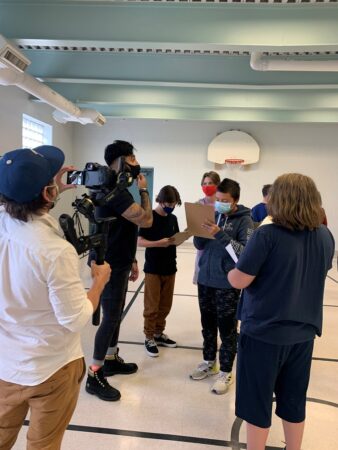
Photo credit: Thunder Bay Police Service
In total, four videos were created: Wali Shah’s Dear Self poem, Kyle’s story, Jessica’s story, and the ‘behind the scenes’ video. Once they were all ready, the TBPS had an official launch with their community partners. “You have to remember that all of this was happening during COVID-19, so the videos were the best way to get the information out to youth in our community,” said Sgt. Tilbury.
The TBPS also launched an art project for the youth to do any kind of writing, drawing, Tik Tok video, etc. They wanted the teens and children to inspire themselves to do something, make the best choices and live their best life. It was a contest, and there would be a free art exhibit at a Thunder Bay gallery for three weeks. “This is the final chapter of the Dear Self project, but the lessons will live on. We need to find more ways to continue to have these important conversations and give our young people the resources and tools to make good decisions,” said Sgt. Tilbury.
Insp. West and Sgt. Tilbury said they both agree that every three to five years, community outreach teams need to adapt and change how they do things in order to stay on top of trends and keep engaging the community’s youth. They know that they will have about another year where these videos will be most effective, and then they will need to innovate again.
“If I could share advice for other departments who are looking to engage their community, I want to stress the importance of just listening to them,” said Sgt. Tilbury. “You need to hear from people with lived experience, even if they’re people that you have conflict with, because you can learn from them. So, listen more and talk less because you’ll find those nuggets of gold. You also need to be willing to change your approach to things. If you organically lift people up, it will have a ripple effect and make your community healthier.”
Want to learn more? You can see each video, created by Thunder Bay Police Service at the following:
- Biskane – Jessica’s Story
- Against All Odds – Kyle’s Story
- Wali Shah – Dear Self Poem
- The making of Dear Self
Print this page
